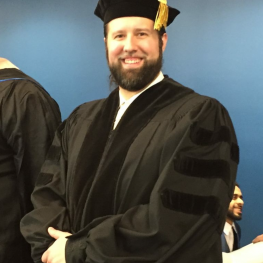
In 2011, Francis G. Olive III made a decision that changed his life. After being laid off from a job as a former corrections officer and counselor of the Hampden County Sheriff’s Depart-ment in Massachusetts, he decided to pursue his dream of becoming a professor of criminal justice.
“Going for my Ph.D. was one of the most challenging experiences in my life. It was a lot of hard work and required countless hours and sacrifices, but it is starting to pay off.”
After four years, in August Olive was conferred the University of New Haven’s first Ph.D. in Criminal Justice. He is now teaching as an adjunct faculty member at the University of New Haven, as well as the University of Hartford, Westfield (Massachusetts) State University, and Elms College in Chicopee, Massachusetts. He recently became the father of a newborn son. Being no stranger to multi-tasking, Olive is also working on multiple projects as a research fellow, which includes working with the New Haven Police Department to revise and update their policies and procedures, working with the Massachusetts State Police in Springfield on their policing strategy, and facilitating “Protecting the Dignity of the Corrections Officer” trainings at the Museum of Tolerance in New York City with Dr. David Schroeder, Associate Dean of the Henry C. Lee College of Criminal Justice and Forensic Sciences. Dr. Olive has been offered a tenure track faculty position at Worcester State University, starting in fall 2016.Dr. Olive will continue working with TYJI as Evaluator and Co-Facilitator of the Transforming Youth Justice: A Leadership Development Program, which is scheduled to begin in April 2016.
“As a student, being part of the TYJI was a great experience for me because it gave me the opportunity to attend Juvenile Justice Policy and Oversight Committee meetings, and I was able to see first-hand how research guides policy. This experience demonstrated how important the coursework in the Ph.D. program is and how research methods and statistics are used in the real world to inform policy decisions that will have a huge impact on the youth population.”